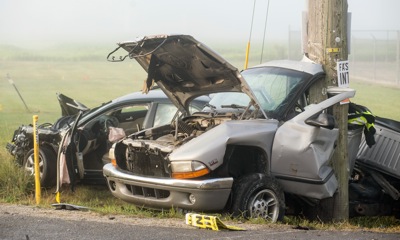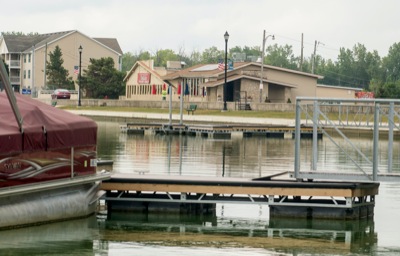Wednesday, August 30th, 2017
Celina council mulls golf cart rules
Issues with speed limit came to light after passage of ordinance
By William Kincaid
CELINA - City officials continue to mull over ways to resolve unforeseen problems that surfaced after the passage of a new multi-use vehicle ordinance.
The policy took effect earlier this month, permitting golf carts and similar vehicles onto city streets with a speed limit of no more than 25 mph. Councilors soon learned people in some areas of town can't travel by golf cart to certain restaurants and businesses without breaking the law by either driving on a 35 mph road or crossing private property.
They also realized that Eaglebrook Subdivision residents for years had essentially been illegally crossing a city street in golf carts - and continue to do so unless permitted under the current law - to make it to all the holes of the golf course.
Unless multi-use vehicles pass a police inspection, they cannot legally be driven on city streets. Those seeking a permit must present a valid Ohio driver's license and proof of insurance. All multi-use vehicles must be legally registered with Ohio license plates and have working brakes, brake and taillights, a horn, a steering mechanism, a windshield, a rearview mirror, safe-condition tires, front and back turning signals, a white license plate light and front and back seatbelts.
City officials at Monday night's committee of a whole meeting proposed numerous remedies but failed to reach a consensus on how to amend the ordinance. However, mayor Jeff Hazel at meeting's end insisted council would "do something to fix it" to ensure citywide use of multi-use vehicles.
"Haveman Road and Grand Lake Road and (State Route) 197 are your problem streets when it comes to golf carts," city safety service director Tom Hitchcock said about the 35 mph thoroughfares where multi-use vehicles are prohibited.
Councilman Jeff Larmore suggested officials locate all landlocked subdivisions and permit multi-use vehicles to travel brief distances on 35 mph roads to the nearest 25 mph road.
Hazel said councilors could also consider allowing multi-use vehicles on all 35 mph roads.
City officials are still awaiting response from the Ohio Department of Transportation about allowing multi-use vehicles on the bike path lane on Haveman and Grand Lake roads, Hitchcock said. He doesn't think ODOT officials will approve of that option because of safety concerns of commingling motorists and pedestrians in the same lane.
As to the issue of Eaglebrook residents having to meet all requirements of the new law, councilman Eric Clausen hinted at creating an exemption.
"If golf clubs are present on the vehicle, they're clearly golfing, and I would think we would leave them to do their golfing business," he said. "I don't know how we're going to handle that."
Unless councilors create an exemption for Eaglebrook residents, they'd put police chief Tom Wale in a tough position, Hitchcock warned.
"Otherwise you're asking the chief not to enforce a law that you passed," Hitchcock said. "That's not a good spot to put him into."
The reality is those residents had been driving illegally for years, Hazel said.
"But once this ordinance went into effect then it became on the radar," he added, pointing out one option would be to exempt those residents from the new law.
Councilman Mike Sovinski said an exemption would be a legitimate consideration for people who decided to live in a golf-course environment.
"That's why the subdivision was built ... to be golf-course friendly, and that's why those people are paying, supposedly, bigger bucks for that," he said, adding that denying them the privilege is akin to depriving them of their assets.
City law director George Moore said he would research the legality of such an exemption.
"I do have some concerns over whether it's permitted under equal protection of law," he said.
Three councilors, however, opposed the idea of granting an exemption.
"Because once you start, where are you going to stop?" councilman Myron Buxton said, adding council would open a can of worms by exempting one group of people.
Councilman June Scott agreed.
"If we start making exceptions for this stuff, other people will step up and say, 'well, we want an exception, too,' " he said.
Councilman Mark Fleck wondered aloud if the city would open itself up to liability by granting an exemption.
"Now you're having golf carts going on the street with no plates ... no insurance," he said. "What if they pull out in front of somebody, and then there's an accident?"
No action was taken.



